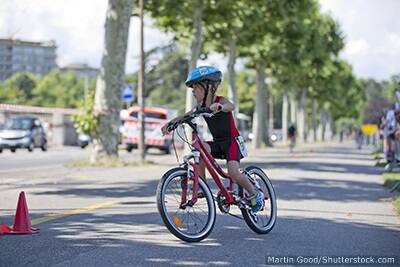Helping Your Young Triathlete with Mental Preparation
by Morgan Johnson
 One of the most common questions I hear from parents as a youth and junior coach is how to help their young athletes with mental preparation and motivation. Demonstrating refined mental tactics is a challenge for athletes of all ages, and the process for developing correct mental responses and strategies may vary greatly from athlete to athlete. So how do you set your athlete on a path toward positive, proactive mental development in the sport?
One of the most common questions I hear from parents as a youth and junior coach is how to help their young athletes with mental preparation and motivation. Demonstrating refined mental tactics is a challenge for athletes of all ages, and the process for developing correct mental responses and strategies may vary greatly from athlete to athlete. So how do you set your athlete on a path toward positive, proactive mental development in the sport?The first and most important step is to understand why your athlete wants to participate in the sport. What motivates him or her? Does he want to be with his friends? Does she just love being active? Does he want the finisher’s medal? Does she want to podium? Does he just want the new red bike? Don’t assume you already know! Even if you’ve discussed it before, motivations can change for athletes on a frequent basis, and sometimes they need additional discussion to even fully understand it themselves. Asking your athlete “why” is the first crucial step in assisting him or her with effective mental development in the sport.
Once you understand your athlete’s motivation to compete (or complete!), here is your next step as a parent: Remind and Encourage.
Remind your athlete of his or her motivation, the goal they are working toward, and the reward that will come at the end of the hard work they are doing. A great mental practice here is visualization, literally “to form a mental image of … to make visible,” in which you help the athlete imagine achieving their goal, seeing themselves cross the finish line, wearing the finisher’s medal, achieving a faster time, etc. Talk through this mental image in great detail — what do they think it will look like, feel like, smell like? (Probably a little sweaty). Once they can see this clearly in their mind, explain that they can pull that image out any time they are feeling discouraged or unmotivated, and it will help encourage them to keep trying for their goal. In 1988 a study of 63 of the world’s best athletes, a whopping 80 percent used visualization to aid in their performance (Hemery, 1988).
That being said … we all know that a day will come when mental imagery may not be enough. So what do you as a parent do when that day comes?
Encourage your athlete. Everyone has tough days, days when goals seem out of reach — especially younger athletes, who don’t necessarily have the cognitive development or life experience to see past the present hardship and onto the bigger picture. Your athlete has plenty of people, such as coaches and fellow athletes, saying what they need to do differently, picking apart race and benchmark results, and depending on them to represent their team (or teams, in the case of many young triathletes). When they are riding home from a disappointing performance, or zoning out on the sofa at home because they had a rough practice, what they don’t need is for their core support system, their family, to start doing the same. First, ask if they want to talk — they might say no at first (especially your teenagers), but you’d be surprised how often this gives them the courage to approach you later on to talk things through. Then you have the opportunity to encourage them by explaining that everyone has hard days and days when things don’t go as planned. Remind them of the progress that they have made since they started pursuing their goal — whether that means learning to ride without training wheels, or pushing 4.5 watts/Kg at lactate threshold. If they’re discouraged because they know they haven’t been doing the work, encourage them to give themselves a clean slate, permission to start fresh in the morning.
Athletic mental development takes time — just like the physical side of development — and there are many and varied techniques that can be taught and trained, but the first and most important aspect of all of these techniques is the source of the athlete’s motivation. Stay in tune with your athlete’s goals, remind them of why they do what they do and encourage them when things get hard. This creates a solid foundation upon which they can build mental tactics that will resonate with them and their goals personally. And always remember, if you see your athlete struggling mentally or emotionally, make sure their coach or coaches are aware of the problem so that they can help him or her take positive steps toward a solution.
Morgan Johnson is a USAT High Performance Team Coach, and the Lead Coach of Playtri Youth & Juniors in Dallas, Texas. She can be contacted for questions at morgan@playtri.com.
The views expressed in this article are the opinion of the author and not necessarily the practices of USA Triathlon. Before starting any new diet or exercise program, you should check with your physician and/or coach.
